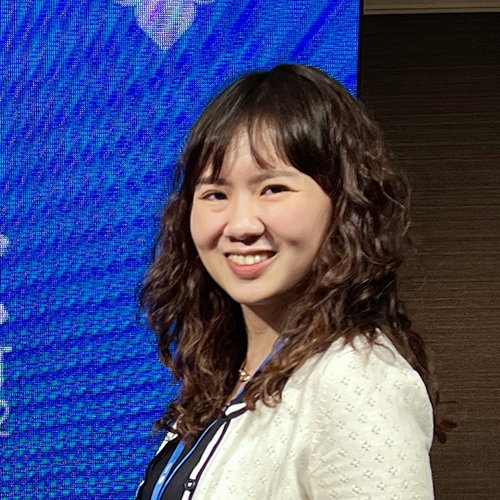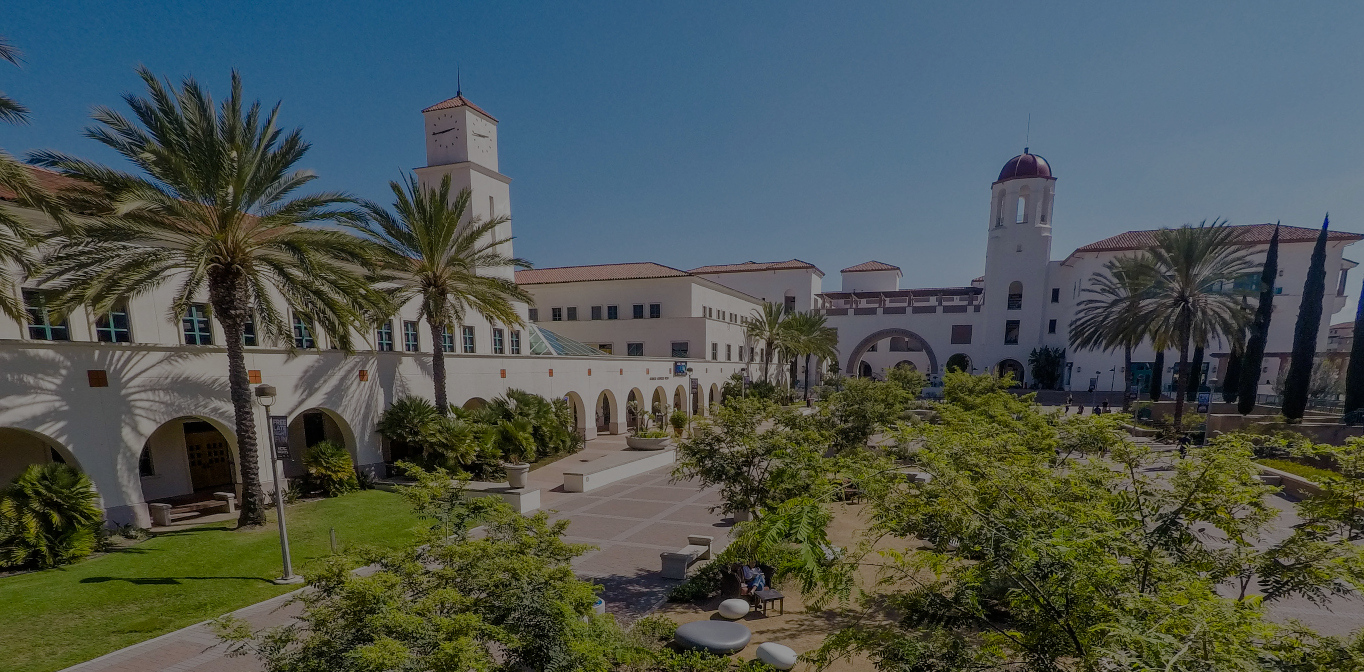Master of Arts Degree in RWS
Master the Power of Language.
The RWS M.A. program offers focused, interdisciplinary training in rhetorical theory, writing, and communication across professional, academic, and public contexts. Students explore the power of language—digital, written, spoken, and visual—to shape knowledge, culture, and change.
We welcome students from a wide range of backgrounds with interests in:
- Professional and technical writing
- Teaching and writing pedagogy
- Rhetorical theory and history
- Digital media and communication
- Rhetorics of culture, politics, and social difference
Graduates are prepared for careers in teaching, curriculum design, professional and technical writing, public relations, publishing, UX/content design, and more—as well as for doctoral study in rhetoric, composition, or related fields.
The program consists of 30 units beyond the bachelor’s degree.
Upon completion of the M.A. program, students will be able to:
DLO 1: Apply disciplinary terminology in the areas of rhetoric, composition studies, and professional writing.
DLO 2: Demonstrate familiarity with historical and contemporary texts in the areas of rhetoric, composition studies, and professional writing.
DLO 3: Evaluate a range of research methods common to rhetoric, composition studies, or professional writing and generate a research proposal.
DLO 4: Create scholarly writing in the areas of rhetoric, composition studies, and professional writing.
DLO 5: Apply writing theories and practices with attention to academic, professional, and/or educational contexts
Program Requirements
The general program is a customizable path that prepares students for a range of careers in writing-related fields as well as the possibility of pursuing additional advanced degrees.
Core Courses (18 units)
- RWS 600 - Reading and Writing Rhetorically (3)
- RWS 601A - History of Rhetoric I (3)
- RWS 602 - Modern Rhetoric and Composition Studies (3)
- RWS 603 - Cultural Rhetorics (3)
- RWS 640 - Research Methods in Rhetoric and Writing Studies (3)
- RWS 790 - M.A. Exam Preparation (3) or RWS 799A - Thesis or Project (3)
Electives (12 units)
Twelve units of thematically focused electives selected with the approval of the graduate advisor.
See our courses page for more information.
The specialization in the Teaching of Writing prepares students to teach writing at the post-secondary level and offers secondary school teachers additional training and opportunities for advancement.
Core Courses (18 units)
- RWS 600 - Reading and Writing Rhetorically (3)
- RWS 601A - History of Rhetoric I (3)
- RWS 602 - Modern Rhetoric and Composition Studies (3)
- RWS 603 - Cultural Rhetorics (3)
- RWS 640 - Research Methods in Rhetoric and Writing Studies (3)
- RWS 790 - M.A. Exam Preparation (3) or RWS 799A - Thesis or Project (3)
Required classes (9 units)
- RWS 512 - Writing Center Practice, Research, and Theory (3)
- RWS 609 - Theory and Practice of Teaching Writing (3)
- RWS 796A - Teaching Internship (3) or RWS 798 - Special Study (3)
Electives (3 units)
Three units of thematically focused electives selected with the approval of the graduate advisor.
See our courses page for more information.
The specialization in Professional Writing prepares students for careers as professional writers in business, the tech industry, government, and nonprofit organizations. It also prepares graduates to teach technical and professional writing in colleges and workplace training environments.
Core Courses (18 units)
- RWS 600 - Reading and Writing Rhetorically (3)
- RWS 601A - History of Rhetoric I (3)
- RWS 602 - Modern Rhetoric and Composition Studies (3)
- RWS 603 - Cultural Rhetorics (3)
- RWS 640 - Research Methods in Rhetoric and Writing Studies (3)
- RWS 790 - M.A. Exam Preparation (3) or RWS 799A - Thesis or Project (3)
Required classes (9 units)
- RWS 504 - Advanced Professional Writing (3)
- RWS 607 - Writing Project Management (3)
- RWS 796B - Writing Internship (3) or RWS 798 - Special Study (3) based on work experience, where appropriate and with the approval of the Rhetoric and Writing Studies graduate advisor.
Electives (3 units)
Three units of thematically focused electives selected with the approval of the graduate advisor.
See our courses page for more information.
How to Apply to the Program
Fall 2026 Admissions
- Submit Cal State Apply Application – February 1, 2026
- Submit Documents (scores and transcripts) to Graduate Admissions – February 15, 2026
- Complete Program Application – February 15, 2026
Step 1: Apply to the University
All applicants to the program must first fill out an online application on Cal State Apply and pay the required fee by February 1. An SDSUid will then be assigned which allows tracking of application status online. The application submission period begins on October 1, 2025.
When applying to Cal State Apply, please make sure to select one of these Rhetoric and Writing Studies M.A. programs as your Major/Program objective:
- 112201 Rhetoric and Writing Studies: Individualized Study (MA)
- 112202 Rhetoric and Writing Studies: Teaching of Writing (MA)
- 112203 Rhetoric and Writing Studies: Tech/Prof Writing (MA)
Please note that the department is Rhetoric and Writing Studies, not English.
Step 2: Submit Official Transcripts and Test Scores to the Graduate Admissions Office
- Official transcripts – from all colleges and universities attended
- And TOEFL scores if applicable
Send to:
Graduate Admissions
San Diego State University
5500 Campanile Drive
San Diego, CA 92182-8225
If you have questions regarding Steps 1 and 2, please contact the Graduate Admissions Office at (619) 594-6336 or email [email protected].
Step 3: Program Application
Must be received by February 15.
Within 72 hours of submitting your initial application to Cal State Apply, you will receive an email with a personalized link to Slate to submit your program application. See the Slate Quick Start Guide for assistance.
You will need to submit electronically:
- Statement of Purpose - A 750-1000 word statement of purpose (explaining reasons for applying to the program, background, interests, experience, as well any other relevant information). This is a very important part of your application. For ideas and help on writing this statement, visit the Purdue Online Writing Lab.
- Résumé/CV
- Writing Sample - A writing sample of minimum ten (10) pages (may be a combination of shorter documents). Academic essays or professional work only, please.
- 3 Letters of Recommendation - Letters should be from faculty members or recent employers.
Please note that the Department of Rhetoric and Writing Studies begins to accept applications on October 1 , 2025 for admission in Fall 2026.
Support
The Teaching Associate Program in the Department of Rhetoric and Writing Studies (RWS) offers exciting opportunities for financial support and teaching experience to graduate students across the disciplines. Teaching Associates are hired to teach one or two lower division general education writing classes (RWS 100 or 200). Positions include a stipend and a half-time tuition waiver. More information can be found on our Teaching Associate Program page.
The Writing Mentors Program offers graduate and upper division students the opportunity to work as course-embedded tutors in department writing courses. More information can be found on our Writing Mentors page.
The SDSU Writing Center provides writing tutoring to students across the entire university. Working with a broad variety of students and assignments provides excellent experience. Specific requirements for employment, as well as more information about the center, are available on the Writing Center website.
The Presidential Graduate Research Fellowship (PGRF) is a university-wide competition designed to recruit non-resident graduate students who demonstrate outstanding potential for achievement in research or creative activity. Awards provide a waiver of non-resident tuition for the first year of an SDSU graduate program, and are renewable subject to good academic standing. Renewals provide a maximum of 5 semesters overall for master’s students, and 10 semesters for doctoral students. Competitive applicants to the RWS master’s program will be nominated by the graduate advisor.
The College of Graduate Studies offers additional funding opportunities. Some awards are open for direct application, while others require a nomination from the advisor or a faculty mentor. See their page for details.

Advising
Jennifer Sheppard
Associate Professor and Graduate Advisor
Office: Storm Hall West 103 | Phone: (619) 594-2696 | Email: [email protected]

